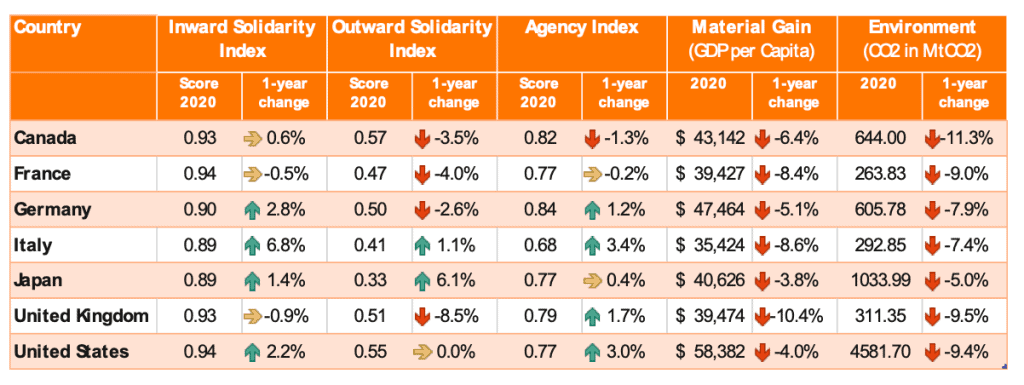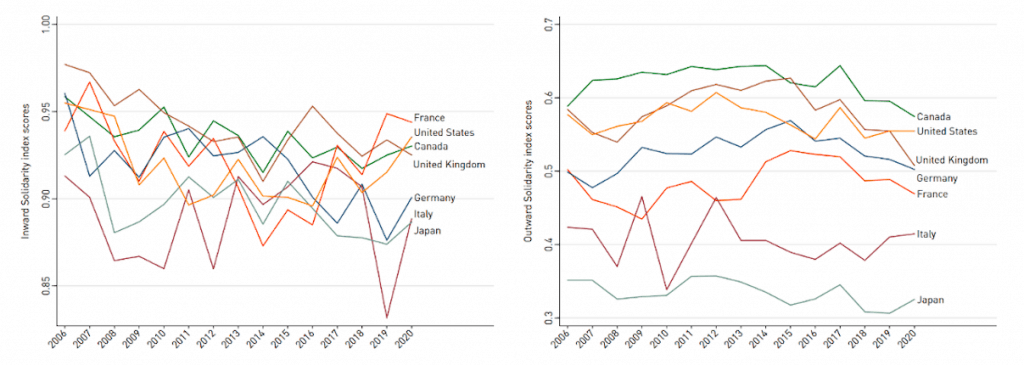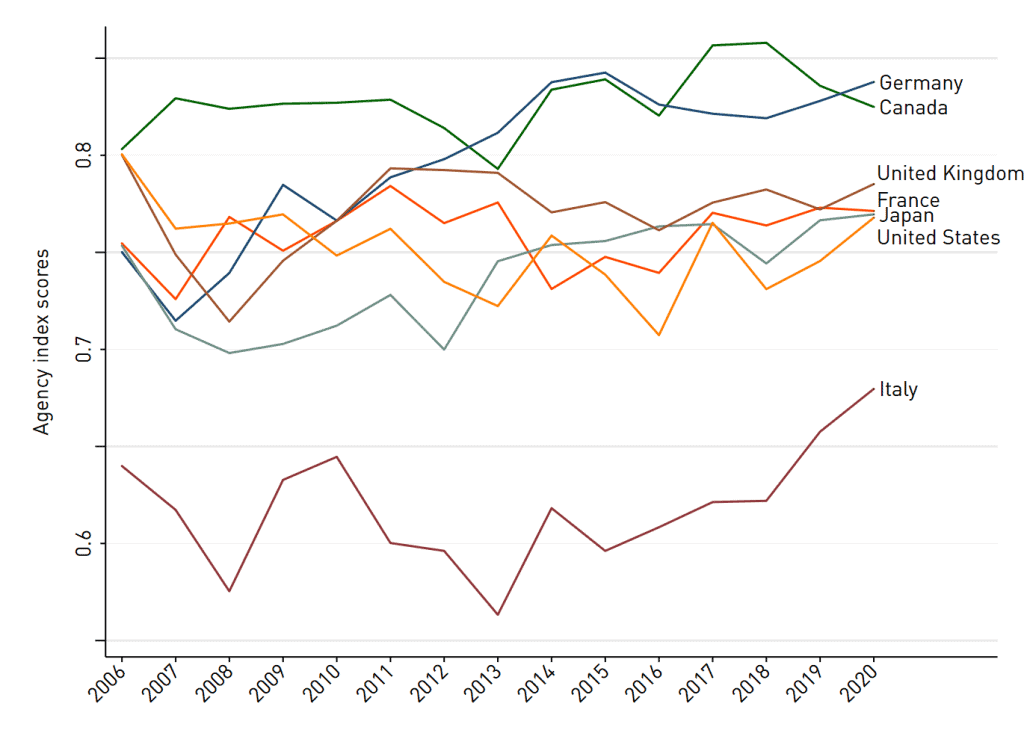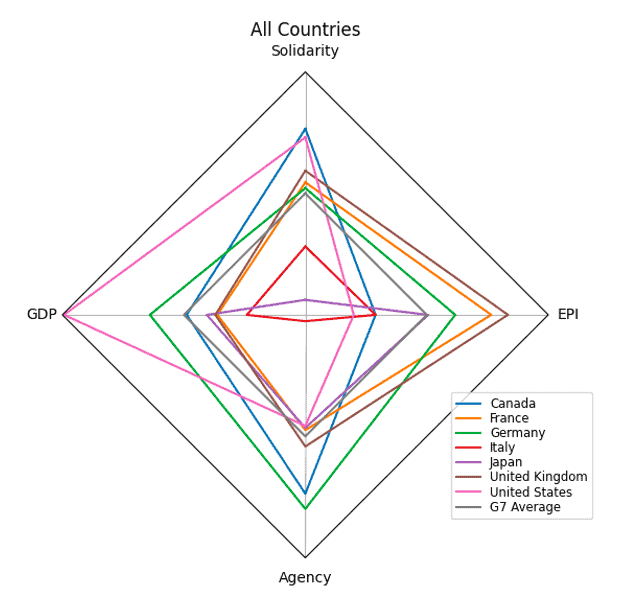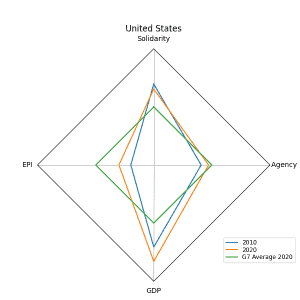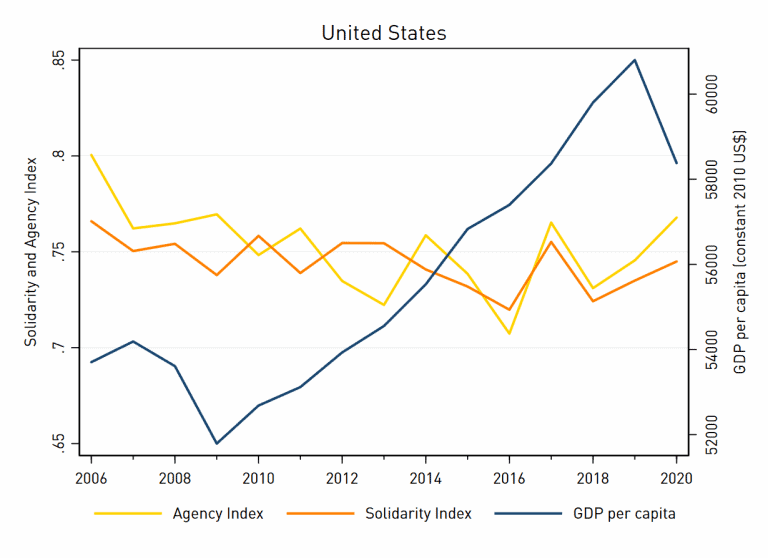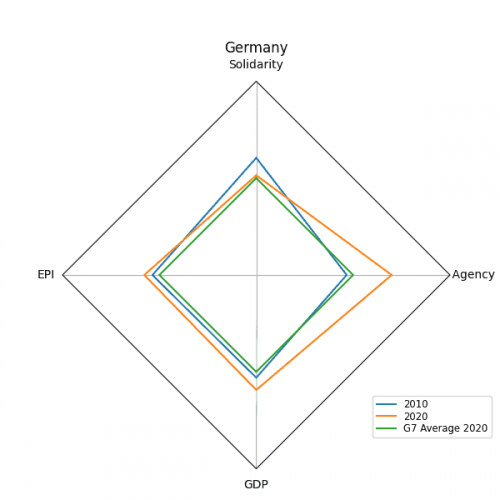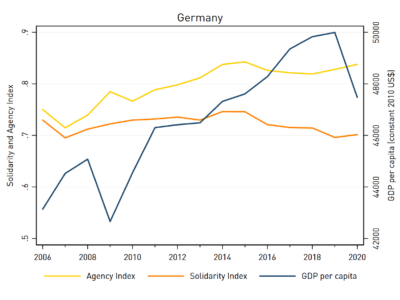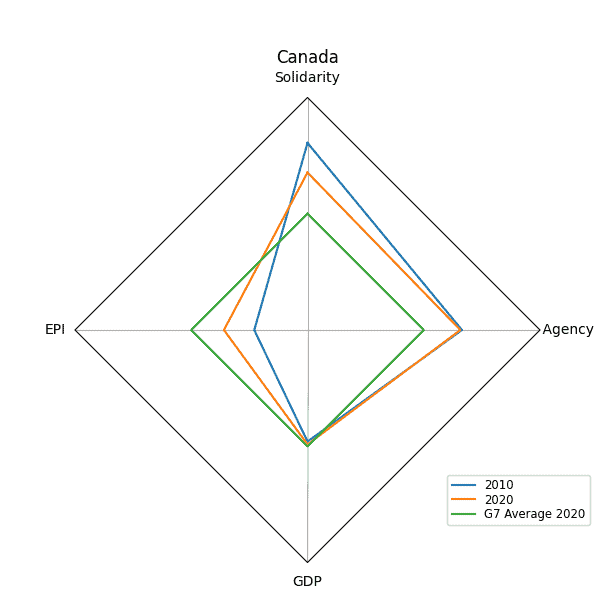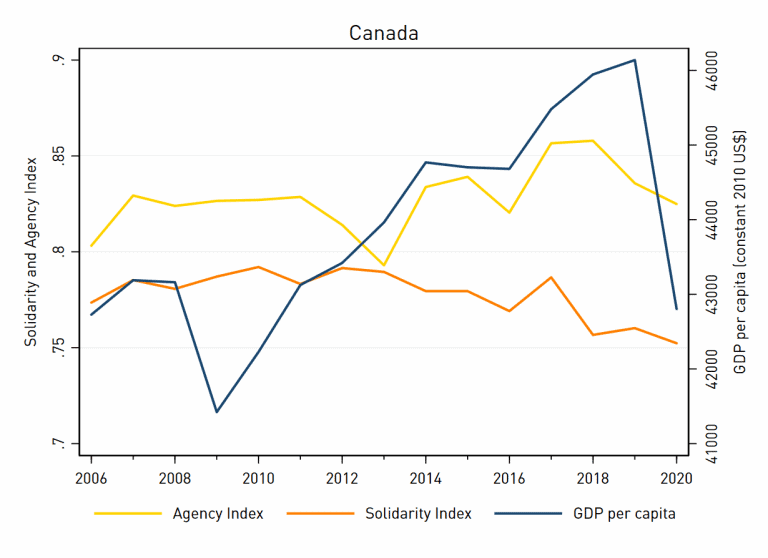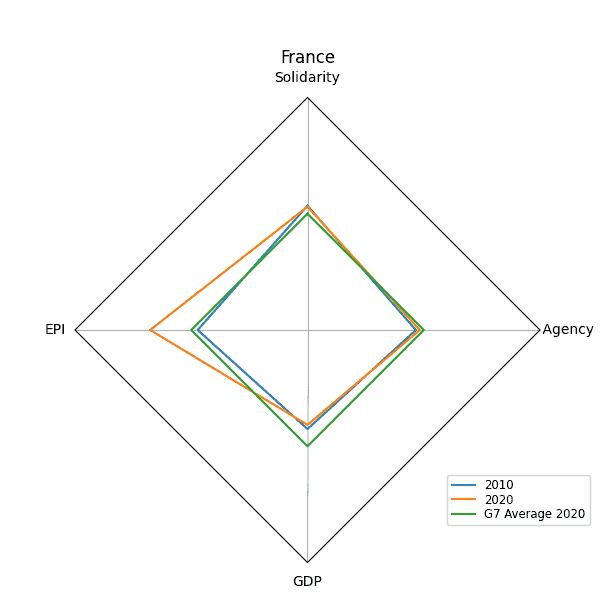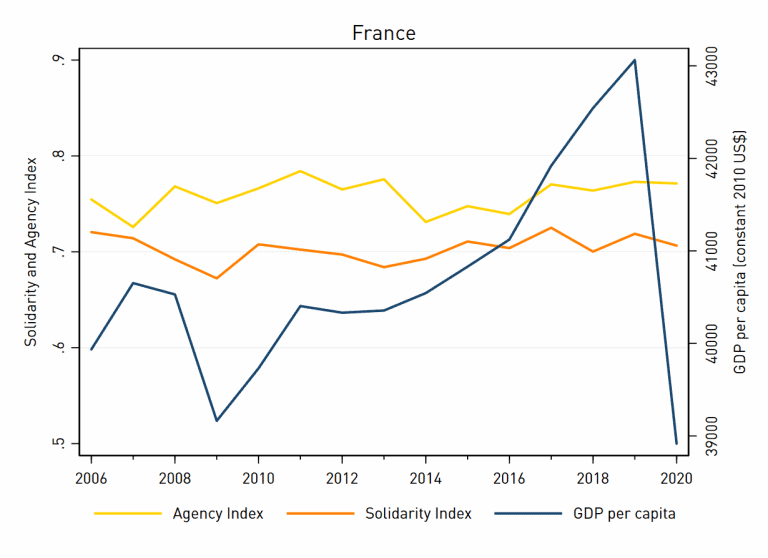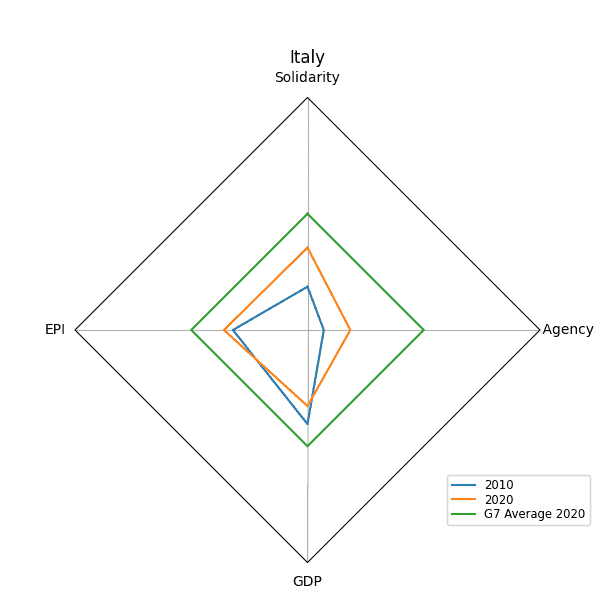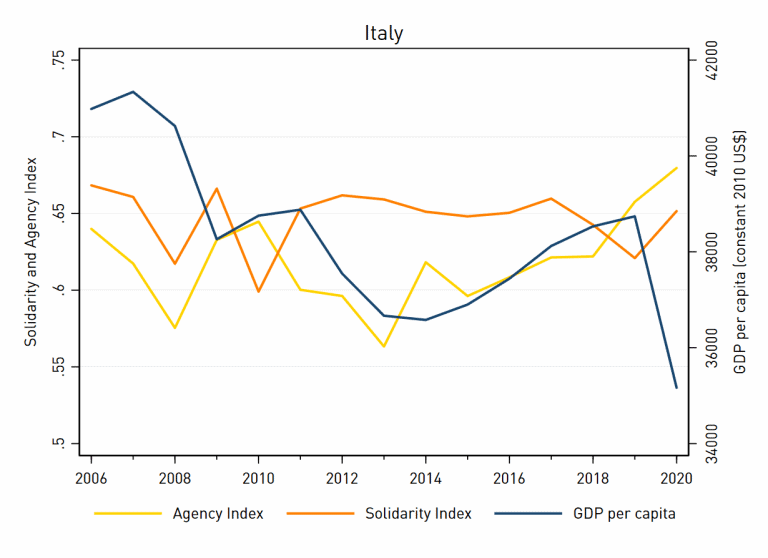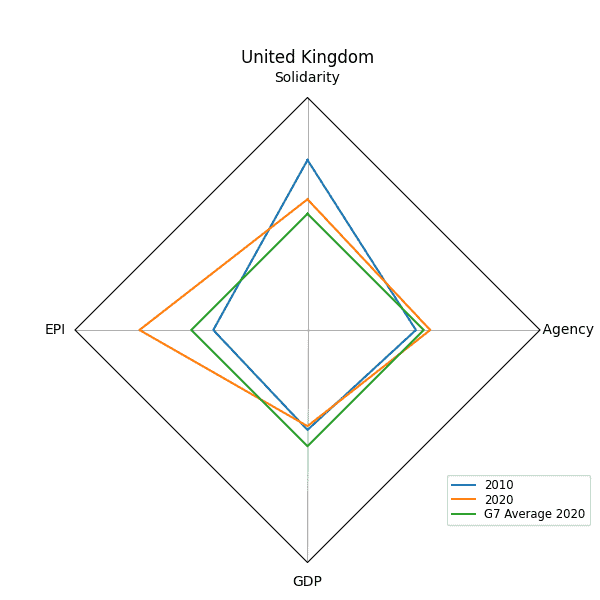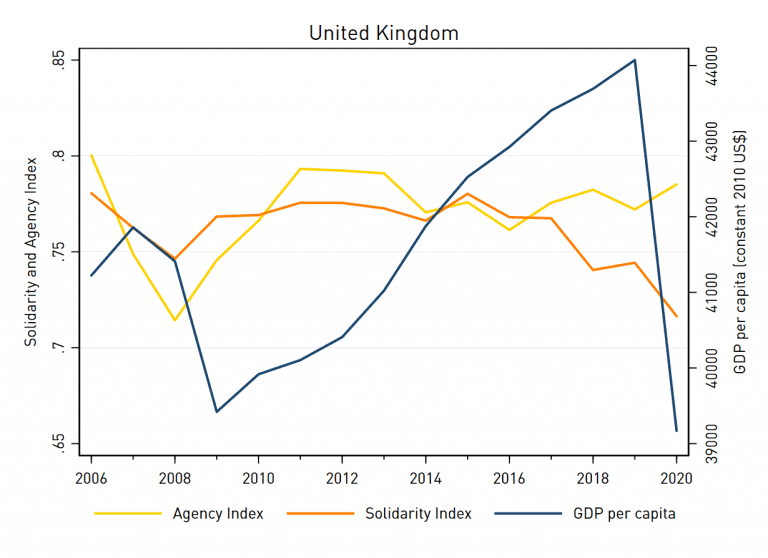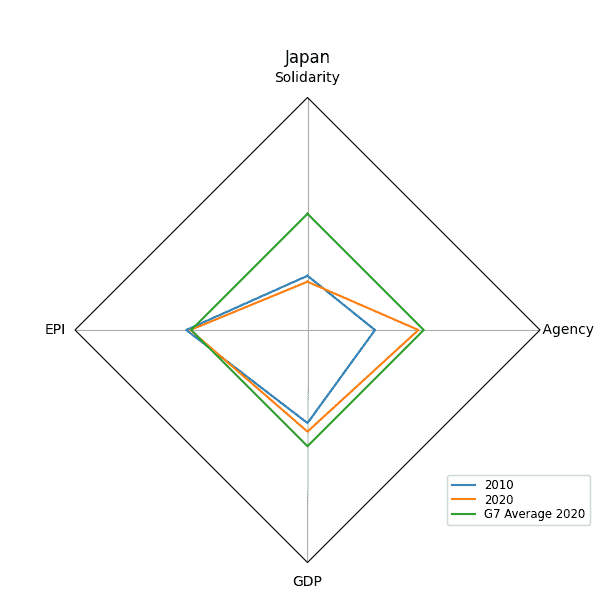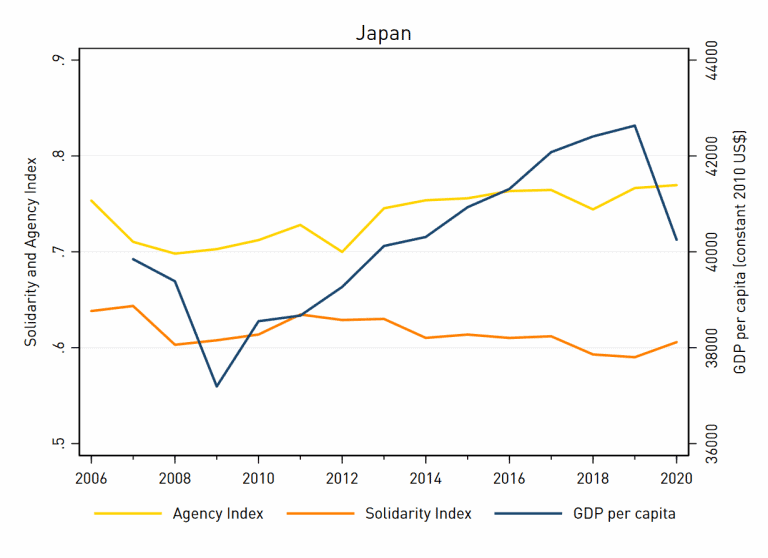Homepage » Programs » Socio-Economic Transformation: Recoupling Dashboard » Recoupling Dashboard 2021
.
The Recoupling Dashboard 2021
How the pandemic changed the relation between the market and society
While Covid slashed the economy, indicators for social and environmental wellbeing are on the rise. According to the results of our updated version of the Recoupling Dashboard, people in the G7 countries have reacted very differently to the pandemic: For instance, Italians and Japanese have shown more solidarity both with their compatriots as well as with other countries while the opposite is true for Canadians and French.
The Recoupling Dashboard 2021 sheds light on interesting effects of the Covid 19 pandemic on social prosperity in the G7 countries.
The Recoupling Dashboard is a country-specific research tool to measure societies’ wellbeing beyond the GDP and illustrates the interdependence of economic prosperity, social prosperity and environmental sustainability. It was first introduced in 2020 in Recoupling Economic and Social Progress by Dennis J. Snower and Katharina Lima de Miranda. It harmonizes social prosperity in two innovative new indexes (agency and solidarity) alongside environmental performance and the traditional index of economic prosperity (GDP) to capture these fundamental dimensions of human wellbeing.
Agency means to influence one’s own prosperity through one’s own strength. Solidarity means being embedded in the relevant social groups. There are two types of solidarity: inward and outward. Inward solidarity is important for social cohesion in close social surroundings. Outward solidarity is important for the will to cooperate with other social groups (such as other nations and cultures). Thus, outward solidarity is necessary to create the political will for multilateralism.
The COVID-19 pandemic changed the relationship between the market economy, state, and society in the G7 countries and beyond. While economies collapsed due to the shutdown of broad swathes of the economy, the state and civil society have gained new significance in protecting people from the pandemic’s effects. This dramatic shift has recalibrated the public’s perception of the role of markets, government, and society in response to the worldwide shock. This is a central finding of our research initiative on “Recoupling Economic and Social Prosperity”, which examines the effects of the pandemic in terms of normative foundations for societal well-being.
Not surprisingly, the GDP decreased in all countries of the G7 due to the economic recession caused by Covid and so did CO2-emissions which are the indicator for Environmental sustainability. The uniformity of response in the economic and environmental domains is illustrated in the last two columns of table below (GDP and CO2 emissions fall in all G7 countries). This uniformity stands in sharp contrast to the diversity of social responses to the challenge of cooperation that the coronavirus posed.
Sources: Solidarity and Agency are based on own calculations using data from the Gallup World Poll and the World Bank, GDP data was extracted from OECD National Accounts at a Glance, CO2 Emissions represent estimates from The Carbon Monitor. Since no data from the Carbon Monitor is available for Canada we use Greenhouse Gas emissions from Climate Action Tracker instead. This is not directly comparable to CO2 Emission from the other source, but gives an indication of Canada’s reduction in GHG emissions in 2020.
Inward Solidarity rose in four of the G7 countries (signaling the resilience of civil societies in providing social support networks where the economic ones had crumbled) and remained roughly constant in the three remaining countries.
By contrast, Outward Solidarity fell in four of the countries (mirroring the well-documented rise in nationalism, including support for the globally damaging “vaccine nationalism”), rose in two countries, and remained roughly constant in the remaining countries. Needless to say, a fall in outward solidarity may be expected to hinder voter support for multilateral efforts to eradicate the pandemic worldwide.
The only clear pattern that emerges from cross-country comparisons solidarity is that Inward and Outward Solidarity have drifted apart in all G7 countries except Japan (as shown below). Otherwise the movements in solidarity are highly idiosyncratic. In two of the countries (Italy and Japan), Inward and Outward Solidarity both rose; in one country (Germany), Inward Solidarity rose while Outward Solidarity fell; in three of the countries (Canada, France, and the U.K.), Inward Solidarity remained roughly constant while Outward Solidarity declined; and in one country (the U.S.), Inward Solidarity rose while Outward Solidarity remained roughly constant. In short, there are many different ways in which societies respond to the pandemic, in line with the different social norms and values, as well as the different relations between civil society and state, across the G7 countries.
Figure 1: Inward and Outward Solidarity Index over the past 15 years in the G7 countries
Those who believe that the global challenge of eradicating the pandemic should have helped prepare the world for dealing with other global challenges are likely to be disappointed. On the whole, citizens of the G7 appear not to have learned the most important lesson that the pandemic could have instilled, namely, that global problems call for global cooperation. Pandemics—like climate change and cybersecurity—cannot be overcome fully anywhere unless they have been overcome everywhere. However, citizens often responded to the pandemic by falling back on their traditional support networks, both national and social. Nevertheless, polls revealed support for some global cooperation (particularly among young, highly educated adults), even at the expense of own national interests. With regard to global cooperation that is nevertheless taking place in response to the pandemic (such as the Covax Facility), policymakers in many countries appear to be more inclined to multilateralism than their citizens.
Inward and outward solidarity: Solidarity may be directed “inwardly” to one’s national, religious, ethnic, racial, or class groups, or “outwardly” to groups with regard to which one does not define one’s social identity. Inward solidarity by itself may promote the well-being of one’s in-group members, but it may lead to conflict with out-groups, and this conflict generally detracts from the well-being of both in- and out-group members. In other words, inward solidarity generates positive externalities for in-group members, but negative externalities for out-group members. Populism, for example, represents a form of inward solidarity that often generates hostility to immigrants, from which social conflicts within nations can arise. However, inward solidarity may also be associated with outward solidarity—as when people with a strong sense of national identity welcome immigrants and benefit from the resulting cultural exchange—generating positive externalities and promoting the well-being of in- and out-group members alike. Inward solidarity is commonly understood as a precondition for outward solidarity—that is, a strong sense of social identity is necessary for openness to strangers.
The Agency Index increased in most countries. Changes in Agency are to be understood in relation to the challenges that people have faced during the pandemic. An increase in Agency may be viewed as an enhanced sense of empowerment that comes from rising to a new challenge, such as dealing with the diverse problems—social and economic—associated with the loss of social contact and work during the pandemic. Under these difficult circumstances, people may have care and support within their communities – opportunities that may be absent under normal conditions. Conversely, a fall in Agency suggests a sense of being overwhelmed and increasingly helpless in the face of the crisis. Agency rose in four of the G7 countries (Germany, Italy, U.K., and US), remained roughly constant in two countries (France and Japan), and fell in one country (Canada).
Title: Development of the agency index over the past 15 years in the G7 countries
Tribalism is on the rise in most G7 countries
A rise of tribalism—measured in terms of the difference between Inward and Outward Solidarity—is a cause for concern. The difference has grown over the past three years in all G7 countries except Japan. This suggests that popular support for multilateral efforts to address global problems—not just pandemics, but also financial crises, cybersecurity, climate change, ocean acidification, biodiversity loss, forced immigration, and much more—is waning. This is particularly unfortunate since these problems are proliferating and multilateralism is the only way to address them.
The discrepancies in the social responses (S and A) to the pandemic may be expected to have potentially important implications for how these countries fare during the pandemic and how well they come out of this crisis.
To gain an overview of the different social responses, we divide the G7 countries into four groups, to give us an impression of how well civil society rose to the challenge of the pandemic:
- We classify a country as “tribalizing” if Inward Solidarity rises while its Outward Solidarity declines or remains roughly unchanged. By contrast, a country is considered “cooperating when both Inward and Outward Solidarity rise.
- A country is “empowering” when Agency rises, and “not empowering” when Agency falls or remains roughly constant.
From this perspective, civil society responds adaptively to the pandemic when it is cooperating (more socially cohesive nationally and more willing to cooperate with other countries) and empowering (addressing the COVID-19 challenges through one’s own efforts). By contrast, when a country’s response is tribalizing and not empowering, citizens tend to be focused primarily on their own health and economic concerns, but are not willing and able to address these concerns by themselves.
People, societies and the state can process and absorb external shocks – the market cannot.
The market economy, was not able absorb the shock as the pandemic has required the closure of many economic activities. For this reason, it was necessary that the state and society step in. This has happened to different degrees in the G7 countries and the short-term impact on economic prosperity has been a sharp decline in GDP in all countries the impact on social prosperity is more diverse as our country analyses shows.
The Recoupling Dashboard shows that solidarity and agency develop differently over time and across countries compared to indexes of GDP per capita and environmental sustainability.
United States
Increasing Agency levels in the US are mainly driven by rebounding confidence in empowering institutions. Life expectancy continues to stagnate on a remarkably low level for an advanced economy while survey results on the perceived freedom to make life choices, in contrast, are high. A slight increase in the Solidarity Index is mainly driven by improvements for Inward Solidarity defined as perceived social support through family and friends. This is mostly offset by a decrease in Outward Solidarity along most dimensions with an improving treatment of minorities being a notable exception. GDP per capita decreased by 1.9%, while the EPI increased by 4.4% during the last 10 years.
Germany
Increases in the confidence in empowering institutions drive a slight uptick in the Agency Index for Germany. While both the decrease in the fraction of the workforce in vulnerable employment as well as average life expectancy are stagnating, the main counteracting force is a decrease in the reported freedom to make life choices. The Solidarity Index stagnates with perceived levels of Inward Solidarity increasing while Outward Solidarity decreases along most dimensions. Again, for Outward Solidarity an improvement in the perceived treatment of minority groups is a notable exception. GDP per capita decreased by 9.4% in 2020, while the EPI increased by 1.6% over the past 10 years.
Canada
For Canada, we observe a decrease in the Agency Index which coincides with reduced levels of trust in empowering institutions and a marked decrease in the perceived levels of freedom to make life choices. The fraction of the workforce in vulnerable employment and average life expectancy both stagnate. Also, the Solidarity Index decreases with an uptick in perceived levels of Inward Solidarity measured by social support through family and friends being offset by a decreasing level of Outward Solidarity. The latter being driven by marked reductions in giving behavior that dominated an improvement regarding the perceived treatment of the poor and stagnating developments regarding minority rights. The GDP per capita decreased by 14.4% in 2020, while the EPI increased by 5.5% over the past ten years.
France
After a marked increase in previous years, the Agency Index for France stagnated in 2020 among all measured dimensions. Noteworthy is that slightly increasing levels of trust in the national government as well as reduced fear of corruption in government are both offset by a marked decrease for trust in the judicial system. The Solidarity Index decreased both along the Inward as well as the Outward dimension with a significant reduction for Giving behavior being a noteworthy driving force. GDP per capita decreased by 19.8in 2020, while the EPI increased by 7.8% during the last decade, placing France only second to the United Kingdom among the G7 nations.
Italy
The Agency Index for Italy increased significantly. This was driven by a marked increase of confidence in empowering institutions (trust in the judicial system shrank slightly) and further improvement in the perceived freedom to make life choices. The Solidarity Index increased slightly with a previous major decline in Inward Solidarity being mostly offset during the last year. Outward Solidarity also increased slightly with improvements regarding the perceived treatment of minorities and the poor being a driving force that offset declining levels of trust in empowering institutions. GDP per capita decreased by 21.2% in 2020, while the EPI increased slightly by 1.5% during the last decade.
United Kingdom
For the United Kingdom, we observe a slight increase in the Agency Index. This reflects a growing share of people satisfied with their freedom to make life choices dominating stagnating developments in other dimensions. The Solidarity Index decreased slightly among both Inward and Outward Solidarity. Notable is again the marked decrease in reported Giving behavior along worsening conditions for the poor that jointly offset slight improvements regarding the perceived treatment of minority groups. Annual GDP per capita decreased by 23.6% in 2020, while the EPI increased by 12.4% during the last decade placing the United Kingdom on the first position among G7 nations.
Japan
For Japan, the Agency Index rose slightly above its 2017 level after a marked decrease in 2018. This development follows an increase in reported levels of Confidence in Empowering institutions along with an uptick in the share of people satisfied with making life choices. The Solidarity Index increased along both dimensions with levels of Inward Solidarity growing again after a decline in previous years. A slight growth in the level of Outward Solidarity is driven by improvements in the reported treatment of minorities and the poor that both counteract the continuing decline of Giving behavior. Annual GDP per capita decreased by 12.3%during 2020. Japan’s EPI stagnated during the last decade.



